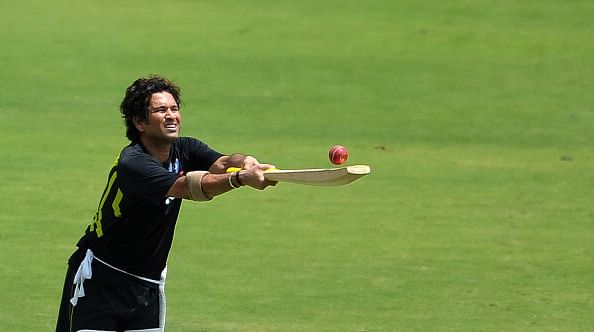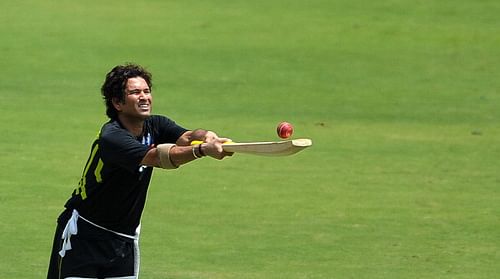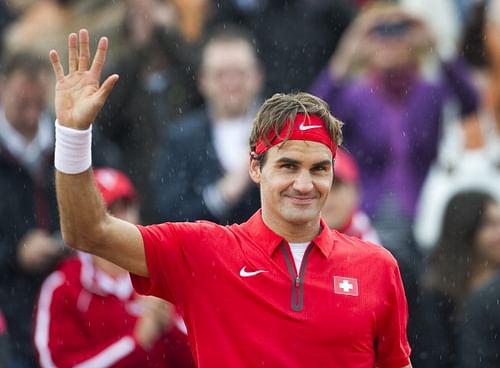
A study in retirement - Why Federer and Sachin should be left alone

‘’In all the chatter and clamor and chest-bashing, and statistic-tossing, a goddamn endless, insane, gleeful cacophony of cricketing praise and persecution, sometimes it’s hard to hear it, but if you go out there, put your ear to the wicket, you’ll hear its sweet strains. Tendulkar’s defiant Last Waltz has begun. Are we hammering out epitaphs here, returning the Great One to his family and some well-deserved sanity? Nope. Just reminding you it’s time to sit back and enjoy the concluding notes, some still polished, some hesitant, of the best bloody batsman to have lit up so many lives.’’
This was Rohit Brijnath in the summer of 2007.
September 2012. If you were to put your ear to the wicket on the fourth day of the second test against New Zealand as a Tim Southee delivery flattened on to his middle stump, you could perhaps still hear the sweet strains of his defiant Last Waltz. The same concluding notes, some still polished, some hesitant…
Rather mysteriously five years on, Tendulkar’s Last Waltz still lingers. A career whose obituary was written years ago still remains an unfinished story in search of a distant sunset. It just might be a little too much if I also asked you to believe that meanwhile, he won the World Cup, captained a T20 side, scored a T20 century, got to the 100th century mark, won Test series abroad and like he always has, scored more runs than I can care to count.
Timelessness is an accepted illusion in sport. Yet there come along a few players, very few and far too apart whose gift never seems to fade. A select class of men who seem to make a mockery of our hard wired notions. Maybe, that’s why we question them at the first sign of weakness, wear our grim smiles as we convince ourselves that the reflexes are slowing down, that the gift is finally fading away. They, on their part have the annoying habit of wiping the smiles off our face, and most of the times, they do it with cricket bats, tennis rackets, golf clubs.

At the Wimbledon in 2002, long after the conqueror – a little known Swiss named George Bastl had left the sunshine of the grass court, Pete Sampras stood still, his face in certain remorse staring at the ground on which he had won seven of the last eight championships. A second round exit on a surface that literally belonged to him, meant for many a critics, an end to the glorious chapter. Nobody saw a Slam with his name on it any more. The best ways for his exit were discussed even as statistics were pulled up to fill the retirement piece that could not be very far away. Three months later, a 30-something man who looked completely washed up late June shouted into the noise of victory, ‘’I f**king did it’’ as he beat Andre Agassi to win his final Slam at the Flushing Meadows the same place where he won his first. The retirement did come soon after, but not before the might of the human will restored our faith in belief and effort.
That is the thing about great players, they refuse to live within the boundaries set by us ordinary men. They constantly question the limits of possibility, they take delight living in places unconquered before. Every mention of retirement will only spur them on. But then, when their talent and sporting prowess are taken apart, they are but human, limited by the ability of their bodies. And here lies the danger. What if the sportsman fails to notice the use by date. What if in his obsession with being the very best, he ignores the fact that his limbs are not getting him where he wants to any longer, that the signal from the brain got to his hand only after the ball has passed the racket. What if in delusion of invincibility, he spends the very end years without achievement. What of his legacy? Will the fickle fans, now busy in worship of a younger hero even give credit to the exploits of his career?
Timing a retirement must be amongst the toughest things for a sportsman. This is where logic and emotion get into a headlong collision, each making their emphatic case, leaving him in an internal mess. When Dravid and Laxman announced their retirements, it was logical. They knew that their best years were behind them, that the century while still coming, was coming a bit too far apart and with a lot more effort. They did not let the picture of a standing ovation at their home grounds blind them from the decision that they knew they had to make. Their exits were graceful and without the hue and cry – very much like their sporting careers. But now, we have the case of Sampras and Phelps. They went by emotion and had two of the greatest exits that the sport has known. When Micheal Phelps dived into the pool for the third leg of the 4×100 meter medley and came out having put his team on lead, en route to his 18th Gold medal, sang ‘The Star Spangled Banner’, gave in to some tears, hugged his team-mates and bid his final adieu, that was pure sporting gold. Surely any sportsman who has played the game for most of his life will want an ending like that, amidst the ovations and the adrenaline rush that comes with thousands of people shouting your name.
That brings us to Sachin and Federer, and the whole big debate about when they should do it. There are opinions that Federer should go the moment he wins his next slam, there are worries that he might spend too many months without a slam and will have to announce his retirement at the post match conference of a third round exit and this would hurt his legacy. There are worries that Sachin might be dropped by the selectors (like that’s ever going to happen) and like Hayden or Katich will have to announce his retirement more out of lack of choice than of it. When I think, I realize, it actually doesn’t matter. Would it have made any difference if Bradman had got those 4 runs in his final match rather than get out for a duck? Would Phelps be a lesser swimmer if he landed only a silver in the final event rather than the gold? Legacies are made during the lifetimes of the sporting career, not at their twilight. Amidst all the hype, like Ian Thrope said ‘People forget athletes were once kids who love what they do.’ So relax, sit back and enjoy their artistry while it lasts. They will know it when their time has come. Not a thing for us to worry. The concepts of legacy and perfect retirements are after all, overrated.